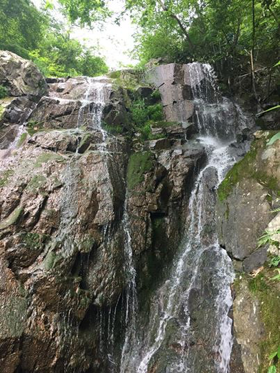April, 2010
Vicky invited me to the opening ceremonies of the 3rd Annual Hangzhou Reading Festival. She promised me a visit to the new Hangzhou main library, a gift of books from the No. 1 in Hangzhou, dancing girls, and a chance to be on TV. Stronger men might have been able to say no, but books and dancing girls were just too much.
The new main library is in the new Central Business District, the new CBD, as everyone here call it. Predictably wonderful. New building, of course, with a grand interior atrium and nice blending of marble and wood for accents on walls and detailing on doors.
The library floor guide is pretty cool, arranged like a book table of contents. It is six metal pages, unfolded like a tour guide brochure, with the inner five leaves making two tents with the wood base on which it sits, with descriptions of floors and book and material locations, in English … and Chinese.
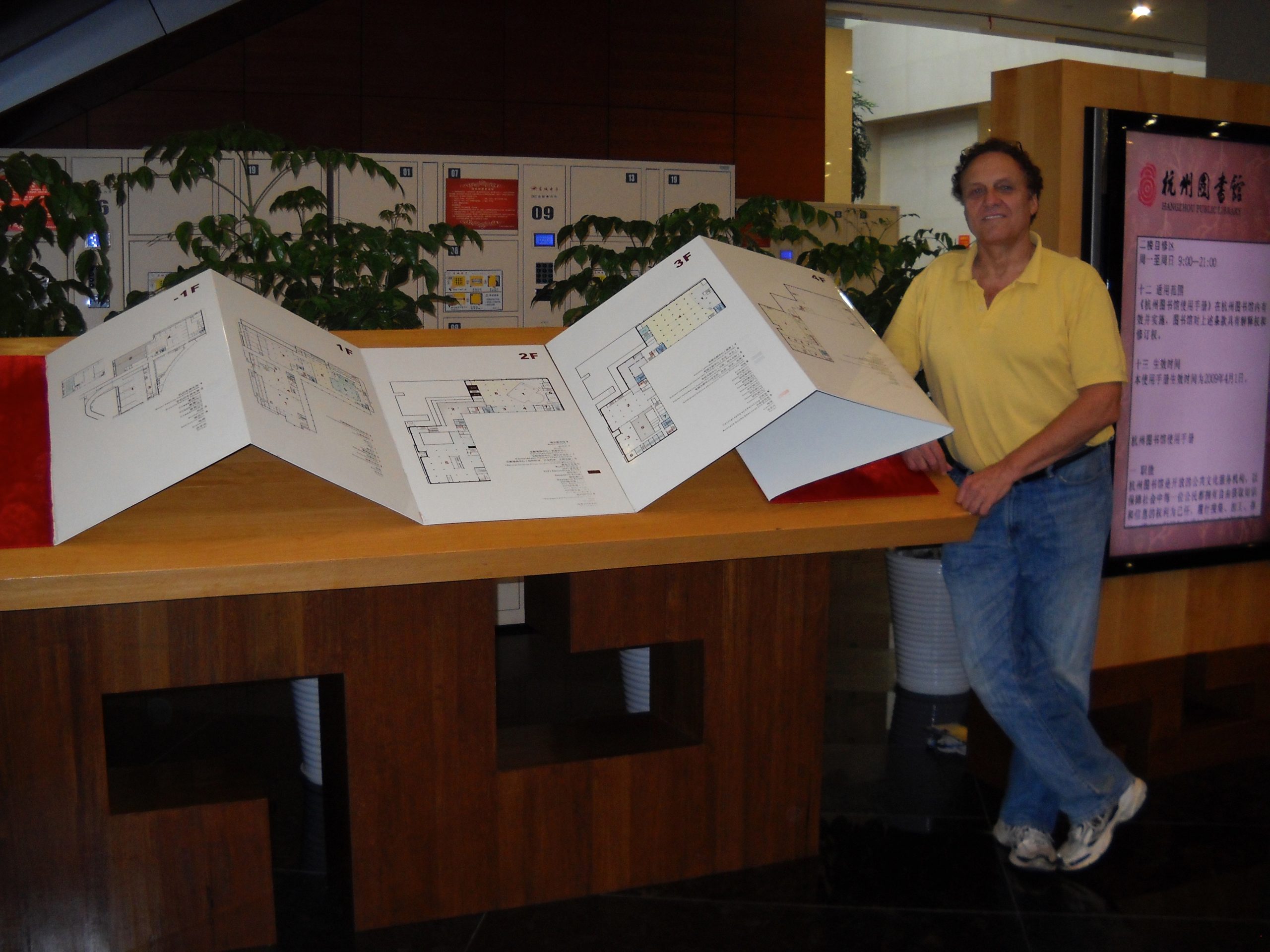
Taking a book out is pretty easy. The scanner that you put the book under tells you when it is due, prints a reminder, and annotates your central file at the same time (this is just my guess. (note – this was in 2009) The guards at the entrances are all dressed vaguely like soldiers in dress uniforms, and while I am happy for the extra security (you know librarians can really get wild) it is a little disconcerting. I guess information is power, and books are information.
There are the hundreds of thousands of books, but their pride and joy (I got the VIP tour from four library employees, courtesy of Vicky) are the video and music rooms. In the video room, there is one 102 inch flat screen, with another dozen or so individual screens at desktops, and if you want to have a video party, the 102 inch screen is in front of about thirty plush chairs, arranged for viewing. The movies are on spinning carousels, like in a retail store, so it is pretty easy to find what you want. They may have some movies in Chinese. I am not sure.
I got the VIP music room tour. Some people, Al and Jeff- really, anyone with musical knowledge- would be agog at what I think I was looking at. This is an audio room with plush seating for about thirty, and three high rows of computer audio Stuff about fifteen feet long at the front of the room, with two sets of speakers about six feet high and two other …. I dunno…. air raid sirens, that were shaped like big tubas about four feet in diameter at the leading edge and looked like they could reliably signal anyone in Hangzhou the next time the White Sox win the pennant. Also a video screen, really a movie screen, about thirty feet by twenty feet. We watched some wonderfully creative performance, I don’t think from China, of English speaking singers singing some kind of modern Italian opera with people flying around the stage and abstract figures moving across. If I could only write while seeing all this. But even that wouldn’t be enough. Somebody needs to come here who can describe this stuff. Someone who knows more words than I do. I can’t do it.
The Hangzhou Reading Festival is put on by the Hangzhou government Culture Bureau, where Vicky works as the director of copyright and intellectual property. At the juxtaposition of copyright and culture is the propaganda bureau, which has the dissemination (and control) of information as its brief. This is China.
This is a festival of reading- encouraging students, and everyone, to read more. This opening event kicks off a series of seminars, shows, and online and texting events that go until the start of spring festival, at the end of January. There are ways to read books online and on your cell phone (a fabulous development that I sadly will miss). There are related arts performances and events, but I did ask again, and it is a reading festival, not an arts festival.
The event was in the big lecture hall in the new library. Lecture hall connotes a big university room with uncomfortable wooden chairs and bad acoustics, but this was a modern Chinese government lecture hall. Plush theater style seating with folding seats, probably enough to hold about a thousand people. A stage with a one step rise. The stage was pretty deep- I would guess about forty feet- and big wing spaces. Sophisticated lighting, of course. Sophisticated sound system, of course. Room between the regular seating and the front of the stage for a row of tables for VIPs and speakers.
One of Vicky’s people is a guy who was in an MPA program in Nottingham, England for a year, so his English is pretty good. He was my guide for the event. The event program starts with an opening speech providing the theory of the event and the festival- this is also peculiarly Chinese. Now I suppose, to be fair, that a book festival in Chicago- say, the one where Mayor Daley picks a book for the city to read- will have its own festival kickoff, and there will be a short speech providing the reason for the event, but the theory of the event stuff just knocks me out. Citing the life long learning component of Jiang Zemin’s Three Represents, the book festival seeks to develop reading among everyone as key to the new China. There is probably a lot of politics somewhere in there, but I can’t see that either. Some of the Chinese students in Chicago describe some Americans- me, I think- as being blind with my eyes open. I think that fits.
When Mr. Xiao and I walked into the lecture hall, the dancing girls were already practicing. One last run-through on the routine before the show. Their teacher was directing, but she didn’t have to do much. The girls- all about age 9 or 10- were on their marks and ready.
The girls- about ten of them, no boys- must have been practicing this for weeks. They were precise, well coordinated, and pretty good for 10 year olds. The musical routine was a story about a girl saying to her mom, “Mom I want dinner,” followed by a sort of dream sequence of the girl dancing with nine brightly dressed chickens. The costumes were a feminist mom’s nightmare- two piece spangled red, shorts and tops, with matching slippers and a big chicken tail, and the girls doing a sort of chicken dance with arms akimbo and moving forward and back, and rear ends out, bodies sort of plucking- you know, a chicken dance- but I can hear the moms screaming in Wilmette right now.
But that is a cultural difference. I don’t think anyone local here sees anything wrong with this, because little girls are not so otherwise thought to be adults. And this is the part of China that is 1950’s America. Even for older kids, the TV shows are full of girls dancing, and hosting events, and interviewing other teenagers, dressed in …. not provocative, just more innocent, I think- styles. So this is a Rorschach test, I guess. What you see is what you get.
The dance routine was about ten minutes of continuous motion, which is a lot. All ten moving in unison when called for, playing with the table the first girl was using for her dinner table- turning it over, using it as a boat to haul her back and forth on the stage, turning it on its side to use as a place to hide- and not all nine were doing the same things at the same time. So this looks to me as if someone spent a lot of time choreographing this, and rehearsing. I suppose this is my wysiwyg moment, but I will bet that the rehearsal did not take as long as it would in the US, and the result- based on my own years of soccer coaching and watching grade school performances- was certainly better. No one’s mom calling to say little Susie has piano practice, and cannot make rehearsals on Thursday… no little Annie trying to stand out from everybody else because her mom told her that’s what she should do …. No one slacking off at rehearsal because she just doesn’t feel like doing this today ….
There is a concept in law and economics called incomplete contracts. Basically, this idea is that it is impossible to write a contract between two parties that covers every conceivable contingent event. Societies have default legal rules for handling such situations- what did the parties intend, what is reasonable in the circumstances, what are the predecents, what are the industry norms…. I am sure Steve or Suzanne or Scott can talk about this.
In little kid team or group events, in the US, the unwritten default rules are usually broadly interpreted. “Ok, fine, Susie can miss rehearsals on Thursdays, but pleeeze try to get her here the last Thursday before the event ….”
I think this is the point at which the Chinese decide, and decided a couple of thousand years ago, that they have a superior culture. The notion of letting down the group is just too shameful to not show up on Thursdays. So you can put on a show like this, with rehearsal and mistakes and somebody getting a cold, for sure, but the incidence of abandoning the group is much less. So more can be accomplished. In less time, with better execution. Without some mom bringing her half baked ideas into a kids performance for the City leaders. My guess is that the kids get a better sense of satisfaction from their work, as well. No one feels like they really would have done better if Susie had been there on Thursdays, because she was.
Okay, this is all wild speculation. I am sure some of the kids felt badly about what they did because it was not perfect. But then … I am not sure about that. I think the idea of the group working well together gives them a great sense of satisfaction, regardless of how it looked on stage. Which was, actually, great.
But now you know why the Chinese stimulus package might not be so harmful to the Chinese economy, even as it creates a real estate bubble, just like in the US. Because of the close relationships in Chinese business, contracts can be rewritten, adjusted, to reflect changed conditions. Contracts are incomplete, but the relationships are not. So in the US, when everybody starts suing everybody else, because there are too many separate contracts, too may separate entities, too much separate ownership, the Chinese have internalized the norms that make such legal maneuverings unnecessary. This doesn’t change the economics, but it changes the accounting and the need to recognize losses. And therein lies the grade school performance gap. Moms in Wilmette, start worrying.
After the performance, the Hangzhou Reading Festival got down to business. The No. 1 in Hangzhou, the Party head, was supposed to be there, but we had to settle for a vice-mayor in the government. So six of us, chosen in advance, went onstage to get a stack of books from the vice-mayor, who was distributing books like a Chicago alderman would distribute Thanksgiving turkeys in the old days. A representative school kid- about 12- a soldier, a farmer, a government employee, a teacher, and the foreigner (me) got a stack of seven books each. I shook the vice-mayors hand, told him in Chinese I was happy to be there, and stood next to the provincial library head for a few minutes for pictures. Given the protocol of events like this, I think the library head was none too happy to be assigned to the foreigner. No local benefit to him. But he seemed to take it, if not well, at least resignedly. There is a phrase in Chinese- wo bu xi zuo- I must do it- that everybody knows and uses when they have to go on studying when dead tired, or work seven days straight for three weeks, or jump to their leader’s call when they should be at a family gathering. No doubt the head of the Zhejiang Provincial Library had that phrase in mind.
In the audience were hundreds of grade school kids, brought in for the event. The kids got an afternoon off from their incredibly long school day, and a chance to learn a little about the government. I was thinking of the kids that would surround Mayor Daley opening a new neighborhood swimming pool. But the theory of the event, the need for life long learning, seemed genuine enough. And sure, kids in China watch tv and play video games, but there is a lot more emphasis on study and learning in school, from the government, and even on tv itself. So the old racially tinged, politically incorrect joke about knowing how the burglars in your house were Asian- the vcr is no longer blinking 12:00, and your kids homework is done- does have that element of truth in it. The emphasis on reading, and studying, is going to get a lot of these kids into Harvard, and Yale, and Stanford. Moms in Wilmette, start worrying.


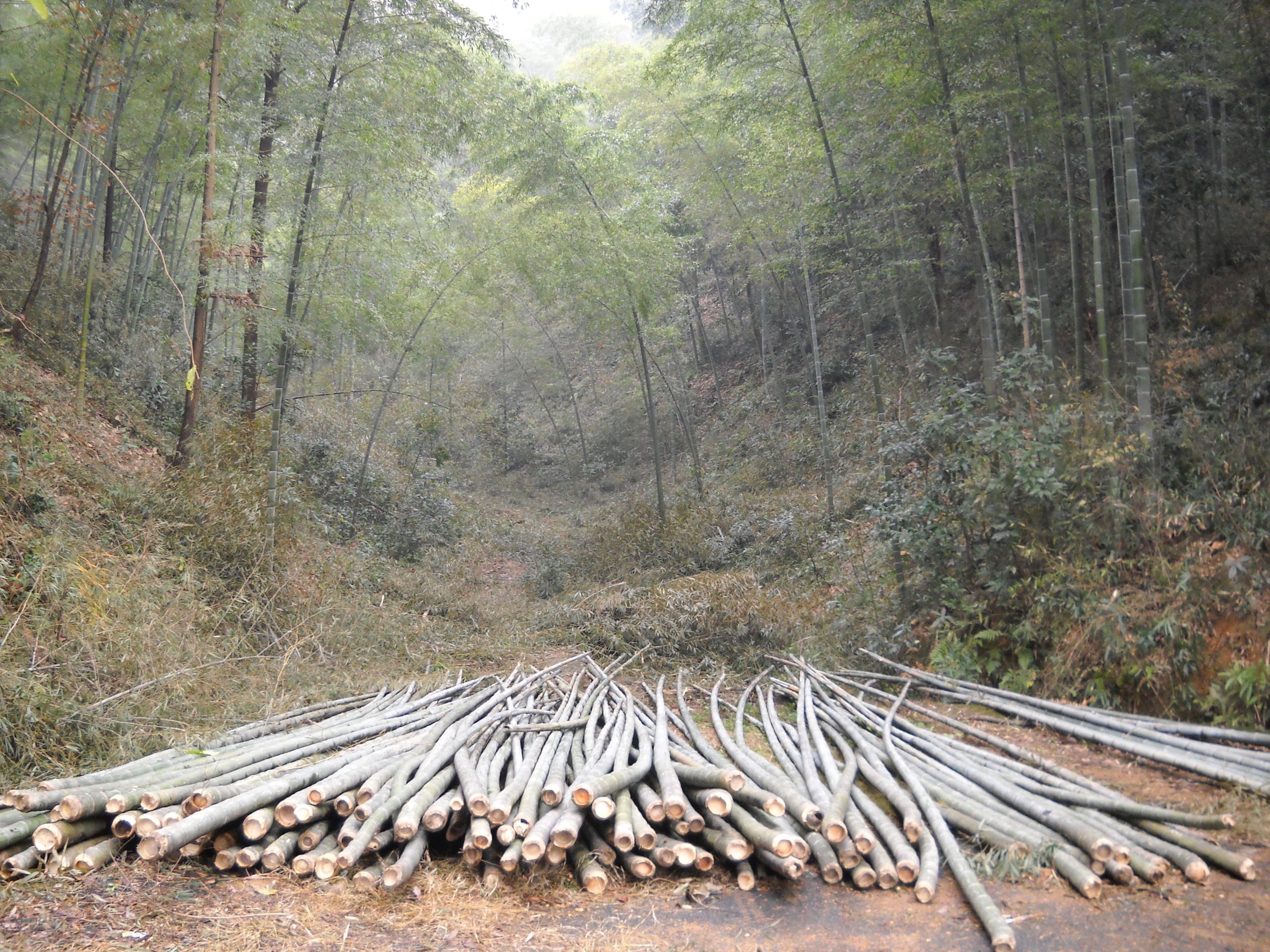 Bamboo harvest
Bamboo harvest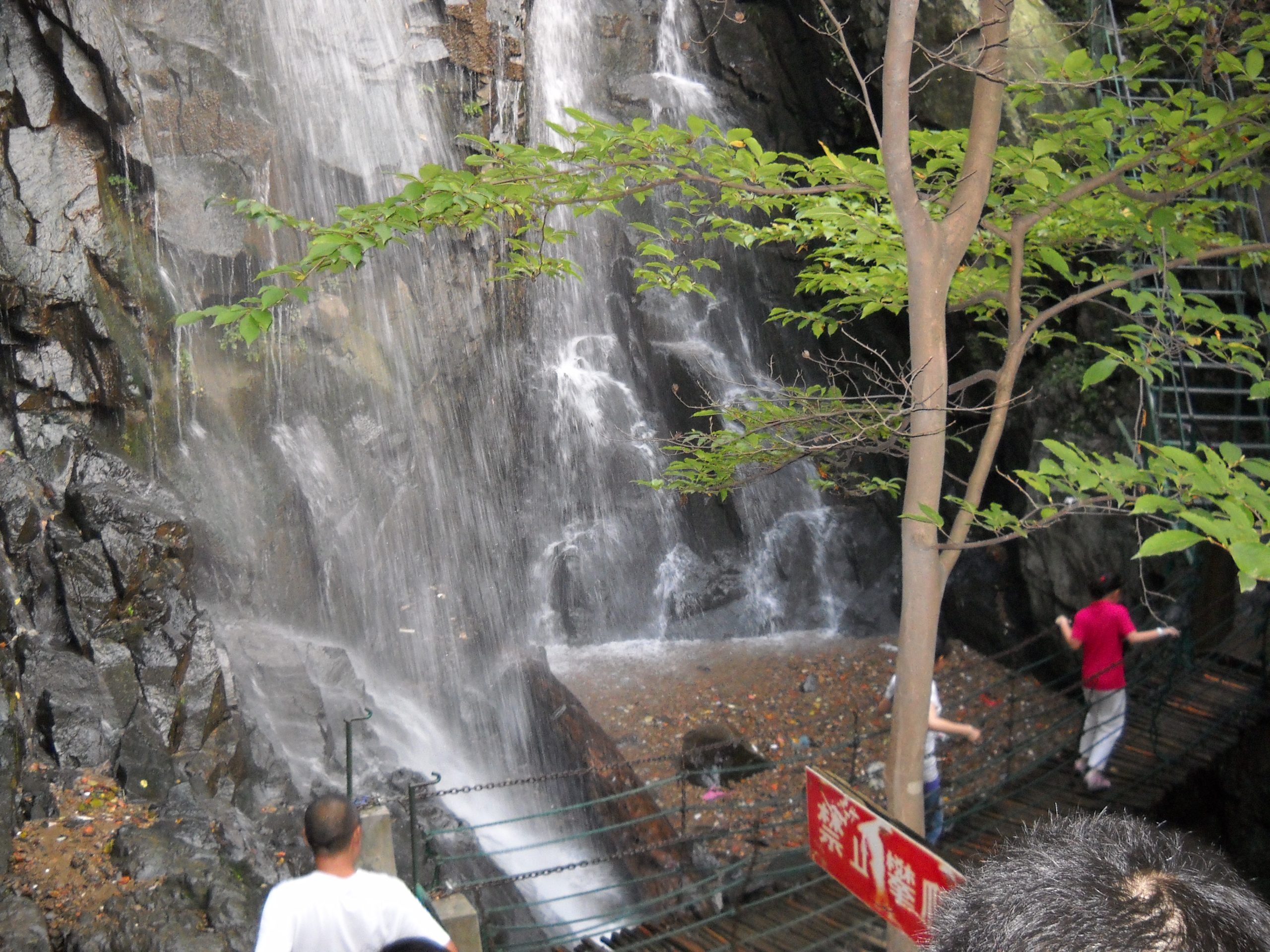 The wood slats are more than a few inches apart … just for fun
The wood slats are more than a few inches apart … just for fun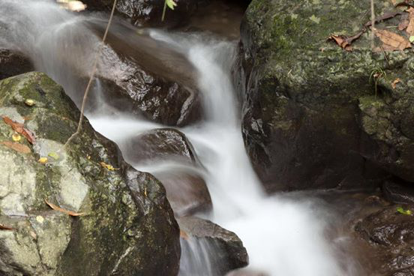 Photo: Leon Chen, at
Photo: Leon Chen, at 